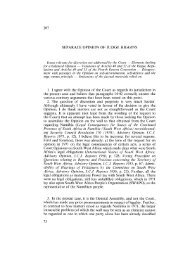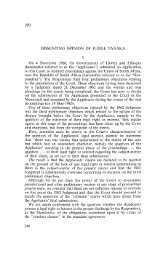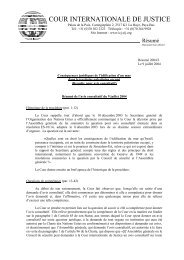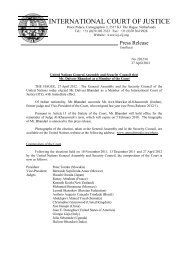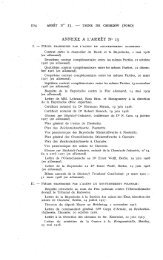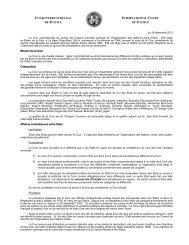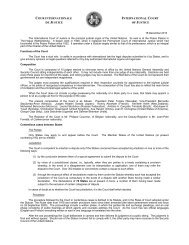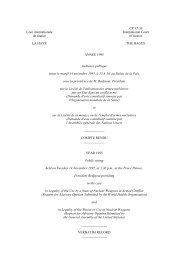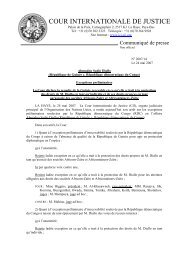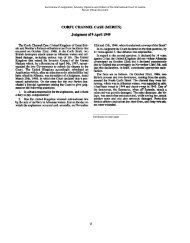botswana/namibia - Cour international de Justice
botswana/namibia - Cour international de Justice
botswana/namibia - Cour international de Justice
You also want an ePaper? Increase the reach of your titles
YUMPU automatically turns print PDFs into web optimized ePapers that Google loves.
(ii) The existence on the part of the State exercising authority of a genuine belief that it has<br />
title (the possession must be a titre <strong>de</strong> souverain).<br />
652. The basic conditions for the application of the doctrine of prescription set forth in the<br />
Namibian Memorial appear to be substantially similar: see, in particular, pages 68-9, paras.<br />
185-7. That being said, the Government of Botswana must make an important reservation.<br />
The exposition of the law in the Namibian Memorial is characterised by a certain blandness.<br />
The case before the <strong>Cour</strong>t is treated as a part of an undifferentiated whole, that is, the law<br />
relating to acquisition of territory.<br />
653. In this context, various familiar authorities are invoked, including the Island of Palmas<br />
case and the Eastern Greenland Case (Namibian Memorial, pp.67-8, para. 184). As the <strong>Cour</strong>t<br />
will readily appreciate, these cases involve wi<strong>de</strong>ly different circumstances, both of political<br />
background and legal context. Moreover, such cases did not involve a boundary agreement,<br />
and this significant difference is to be borne in mind.<br />
(B) The Impropriety of the Namibian Prescription Argument<br />
654. The position of the Government of Botswana can be conveniently summarised as<br />
follows:<br />
First: given the nature and purpose of the <strong>de</strong>finition of the river boundary in the Anglo-<br />
German Agreement there is ipso jure no room for the application of the doctrine of<br />
prescription.<br />
Secondly: in the alternative, the conditions for the application of the doctrine of prescription<br />
have not been fulfilled.<br />
Thirdly: in any event the Namibian Government is bound by the recognition by its<br />
pre<strong>de</strong>cessors that, in terms of the Anglo-German Agreement, the northern channel constitutes<br />
the 'main channel' of the River Chobe.<br />
655. The first objection to the prescription argument must be its impropriety, that is to say, the<br />
inapplicability of such an argument to a river boundary expressly <strong>de</strong>fined by treaty as in<br />
Article III, paragraph 2, of the Anglo-German Agreement.<br />
656. As a preliminary step, it is appropriate to recall that the whole point of prescription is to<br />
give a relative legitimacy to what would otherwise be unlawful. Numerous authorities give<br />
emphasis to this role. Thus, writing only six years after the conclusion of the Anglo-German<br />
Agreement, Professor Audinet observes that:<br />
"La prescription aurait donc pour but <strong>de</strong> suppléer au consentement, qui a fait défaut:<br />
consentement <strong>de</strong> l'État, <strong>de</strong> la population ou <strong>de</strong> l'un et l'autre". (Revue générale <strong>de</strong> droit<br />
<strong>international</strong> public, Vol. 3 (1896), p.313, at p.318: the text of the article is reproduced in<br />
Annex 2).<br />
657. In his study, The Acquisition of Territory in International Law, Professor Jennings (as he<br />
then was) refers to 'prescription strictly so-called, where the actual exercise of sovereign<br />
rights over a period of time is allowed to cure a <strong>de</strong>fect in title; the case, that is to say, where



